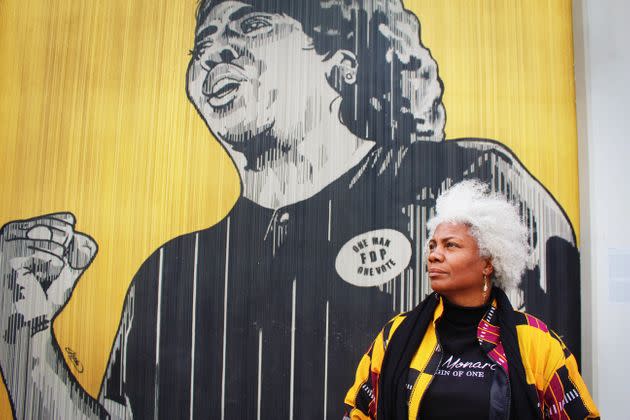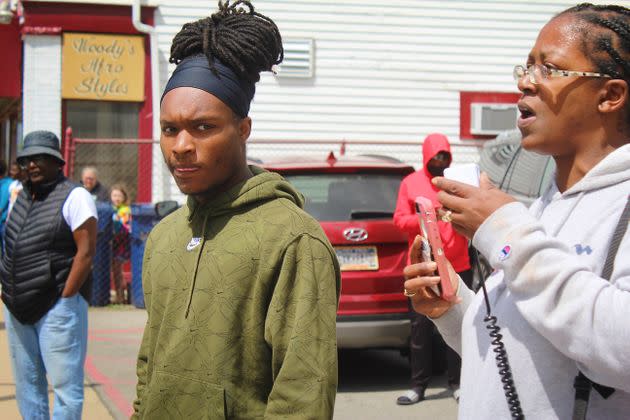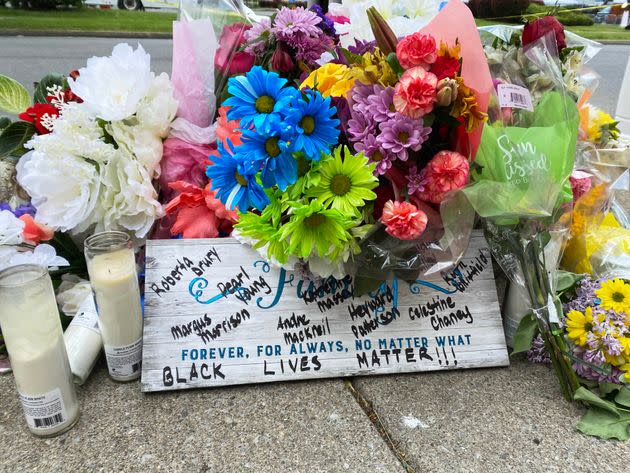This Cop-Turned-Activist Won’t Let America Forget The Racist Massacre In Buffalo
- Oops!Something went wrong.Please try again later.
- Oops!Something went wrong.Please try again later.

Cariol Horne became a fixture for police reform in Buffalo after she stopped another officer from choking a Black man during an arrest. Her influence became evident again after she helped her community following the Buffalo mass shooting. (Photo: Phillip Jackson/HuffPost)
BUFFALO, N.Y. ― After a gunman opened fire in a supermarket in a Black neighborhood in Buffalo, New York on May 14, Cariol Horne was among the first on the scene.
Horne isn’t a cop ― at least, not anymore. She served as an officer for 20 years, up until she was forced out of the Buffalo Police Department in 2006 for intervening when a white officer used excessive force on a Black man.
Now, she’s a local activist in this predominantly Black community. She is a Black woman too. And she knew she needed to be there to help her neighbors after an 18-year-old white male, who posted a long, racist screed before he drove several hours to Tops Friendly Market, shot 13 people ― 11 of whom were Black.
There was an immediate outcry against racism in the wake of the shooting, but Horne worries it will quickly fade away. Ten days after the racist attack in Buffalo, another 18-year-old opened fire in a Texas elementary school, killing 19 children and two teachers.
Buffalo activists and others want to be sure the racist attack isn’t forgotten. Vice President Kamala Harris said “enough is enough” over the weekend after visiting the funeral of Ruth Whitfield, an 86-year-old Black woman who was killed by Payton Gendron the day of the Buffalo shooting.
“We have had no real change as far as ending racism because it is like we start dealing with it and then we stop,” Horne, a mother of five, said of the U.S. “We just take a pause. But there should be no such thing as taking a pause.”
Horne’s own life has been marked by violence against Black people, its aftermath and how the country’s racial reckonings can make change ― but still fall short.
In the incident that upended her career, Gregory Kwiatkwoski, a fellow police officer had David Neal Mack in a chokehold during an arrest, a tactic law enforcement has done in the past but now has been condemned nationwide. Horne yelled at Kwiatkwoski to stop. When he didn’t, she grabbed his arm from around Neal’s neck.
Kwiatkwoski punched her in the face.
The department sided with Kwiatkwoski. Officials said that Horne endangered him during the arrest. She was offered a suspension, faced multiple internal disciplinary charges and then was fired months before she would be eligible for her pension.
“The good old boy system and white supremacy system was still in place,” Horne said.
That was in 2006. It took until September 2020, following the death of George Floyd, for anything to change.
The Buffalo Commission Council passed “Cariol’s law,” giving officers the right to intervene if another officer is using excessive force. Prior to the law passing under her name, the Buffalo Police Department was not paying Horne her pension. After the law was passed, a New York Supreme Court ruling in 2021vacated Horne’s firing.
Now, Horne feels she is left with another mission: Mending a racially terrorized neighborhood that already suffered from issues of neglect in the city.
“We [America] are constantly focusing on other issues other than black issues,” she said. “In 2020, America got 20/20 vision. Now they can see all the hate and all we have been talking about. They were gaslighting us all along. Even after George Floyd, we still have not had any significant change.”
The day Biden came
The Buffalo race massacre has brought the city’s local and racial segregation issue into the spotlight. And after top leaders, reporters and other prominent national activists leave their town, Horne wants Buffalo’s needs to still be remembered.
When President Joe Biden visited on May 17, Horne was among 200 or more people who gathered at a rally just outside of the community center where he was set to speak. She and other activists, including Myles Carter and David Louis, spoke to the crowd. Horne’s gray curly afro blew in the wind as she demanded an end to racial terrorism to Black neighborhoods.

David Louis, a local activist (left), looks on during a rally outside of a neighborhood community center the day President Joe Biden came to give remarks following the Buffalo mass shooting. (Photo: Phillip Jackson/HuffPost)
They wanted Biden to see an example of it.
Horne led the crowd in chants while calling for law enforcement to let Robin Gary inside the center where Biden was speaking. Gendron had pointed a gun at Gary’s head while she was with her daughter inside the supermarket. His gun left a heat mark on her head. She was a survivor of Gendron’s racist attack and did not deserve to be left behind, Horne said.
And while she understood national security’s presence outside of the community center, the added presence of state police standing in line and blocking residents did not sit well with her.
Eventually, law enforcement let Gary inside of the center. But shouts for Biden to do more on addressing America’s racial issues head on, continued.
Multiple residents said that “nothing changed” since George Floyd was murdered and that Biden never felt a need to come to their community until this recent tragedy.
“I feel like it was a big distraction,” Louis said. “A lot of people got caught up with the president coming. When [it’s] Cariol who has been here, is actually doing something for us.”
Cariol’s policing and race solutions
Buffalo’s East Side has now been thrusted in the spotlight and Horne wants the country to know that they need more “resources in the community.”
She and other activists believe Gendron took advantage of the long neglected neighborhood. He exploited the opportunity to gun down Black people in their only community supermarket because he and others like him did not care about their lives.
“To go through the civil rights movement, and to witness the murder of George Floyd, it is really like what has changed?” Horne said.
She has ideas for solutions.
She wants the country and all local police departments to take on Cariol’s Law to encourage officers to intervene when they witness others engage in excessive force. She also wants youth to have access to trauma and mental health services that would help them develop better conflict resolution during disagreements.
And she wants America’s grim record of racism, violence and oppression towards Black people in the country taught in Buffalo’s school systems.
One thing she does not believe will help is putting more money into police budgets. This year, the Common Council in Buffalo approved a $5.2 million dollar budgetfor the Buffalo Police Department to purchase at least 20 new police vehicles and create 14 new detective positions.
Many other cities in the country, with Biden’s backing, are increasing the amount of money being allocated to departments.
The East Side, meanwhile, desperately needs funding for revitalization. Near the community center where Biden spoke, there are boarded up homes, uneven sidewalks and roads spotted with potholes.
Over the last 30 years, conditions have worsened for Black Buffalo residents, with many of them out of work, lacking higher level education and living below the poverty line, according to a report that traced the Black lives of Buffalo starting from the 1990s.

Flowers left outside of Tops Friendly Market and a sign with the names of the 10 people who were killed in what authorities have described as a “racially-motivated” shooting at a Buffalo, New York, on May 14. (Photo: Phillip Jackson/HuffPost)
The study, compiled by researchers at the University of Buffalo, noted that communities remained segregated based on “house value and social class” and ultimately trapped Black residents in low-income and marginalized neighborhoods. Researchers also found that due to low levels of education attainment, fewer Black residents were able to find jobs with good wages.
Horne is calling for more from the president and America as a whole. She said she wants Biden to sign a hate crime bill aimed at protecting Black people ― similar to the legislation he signed last year, addressing hate crimes against Asian Americans after a man went on a shooting rampage at three spas in Atlanta killing eight people, including six women of Asian descent.
People of color in America have always been oppressed and historically treated unfairly — especially Black residents since the country’s inception, Horne said. If the president took up the matter, she would be happy to help.
“Joe Biden is a very busy man so he may be forgetful. I think he should put me in charge of policy for [the] police and give me the budget. I don’t want to put that burden on him,” Horne said.
“I would like to create an act, like ‘Cariol’s Law,’ to protect Black people,” she continued. “Because if you protect Black people you protect all people. If you put your focus on the issues we have been screaming about since we have been enslaved, then we would have change.”
This article originally appeared on HuffPost and has been updated.

